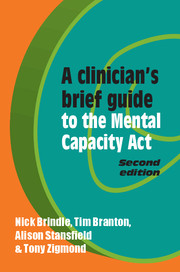Book contents
- Frontmatter
- Contents
- Preface
- Preface to the second edition
- Common abbreviations and terms
- 1 The legal framework: the Mental Capacity Act, the Human Rights Act and common law
- 2 The Mental Capacity Act and the authority to treat
- 3 Assessment of capacity
- 4 Best interests
- 5 Alternative authority – planning for the future
- 6 Independent Mental Capacity Advocates and regulation of research
- 7 Deprivation of Liberty Safeguards
- 8 The Court of Protection, clinically relevant judgments from the courts and writing reports
- 9 The Mental Health Act
- References
- Index
1 - The legal framework: the Mental Capacity Act, the Human Rights Act and common law
Published online by Cambridge University Press: 01 January 2018
- Frontmatter
- Contents
- Preface
- Preface to the second edition
- Common abbreviations and terms
- 1 The legal framework: the Mental Capacity Act, the Human Rights Act and common law
- 2 The Mental Capacity Act and the authority to treat
- 3 Assessment of capacity
- 4 Best interests
- 5 Alternative authority – planning for the future
- 6 Independent Mental Capacity Advocates and regulation of research
- 7 Deprivation of Liberty Safeguards
- 8 The Court of Protection, clinically relevant judgments from the courts and writing reports
- 9 The Mental Health Act
- References
- Index
Summary
Clinical practice involves doing things to, and for, other people. Touching, undressing, examining and medicating another person require some legal authority. Depending on the circumstances, that authority is established in England and Wales within the common law, the Mental Capacity Act 2005 (MCA), the Mental Health Act 1983 (MHA) and, underpinning it all, the European Convention on Human Rights (ECHR) as incorporated into the Human Rights Act 1998.
‣ Common law is judge-made law. It is a body of law made up entirely of principles developed organically from individual court cases on a caseby- case basis. As Lord Donaldson said, ‘The common law is common sense under a wig’. Common law cannot be used where there is a statutory alternative, i.e. statute law overrides common law. For those practitioners who worked prior to 2005, this is particularly important. The common law authority to act in the best interests of a person who lacks capacity has been almost entirely replaced by the MCA.
‣ Statute laws are laws passed by Parliament and called Acts.
‣ Judicial interpretation of statute law Judges also interpret the statutes passed by Parliament and make rulings on these.
‣ European Law is a potentially confusing term because there are two distinct types of European law. There is European Law passed by the European Union (EU). These laws tend to make specific requirements of member countries and are binding on those countries. An example is the European Working Time Directive. The other European law, and in relation to clinical decision-making much more relevant, is the European Convention on Human Rights (ECHR). This is incorporated into UK law by the Human Rights Act 1998. The latter makes some specific requirements of UK national laws (which must be compatible with the ECHR) and also sets a framework for the interpretation of national laws and practices both by the UK courts and individual clinicians.
‣ State compliance with the ECHR is determined by the European Court of Human Rights (ECtHR).
- Type
- Chapter
- Information
- A Clinician's Brief Guide to the Mental Capacity Act , pp. 1 - 19Publisher: Royal College of PsychiatristsPrint publication year: 2015



